

English version
Hello, great community of @hivegc. Not too long ago, I talked about the ability of video games to help us cope with bad times, something that happened to me firsthand with Kingdom Come Deliverance and its great capacity for immersion. This is certainly common, the healing power of this art, especially allowing our minds to enter fictional worlds where we can rest from the tough times we experience in the real world.
However, it's not so common for a video game to do the reverse and use real-world problems as inspiration. This is what happens with Wanderstop, which at first glance is a tea shop simulator with the classic cozy packaging that's so fashionable, but which is primarily a work that reflects on issues such as burnout syndrome, the obsessive pursuit of productivity in our current civilization, and the inadvisability of finding simple answers to complex problems.
Wanderstop was one of my most anticipated video games of 2025, and the main reason was its two visible heads: Davey Wreden and Karla Zimonja. The former is responsible for two video game milestones such as The Stanley Parable and The Beginners Guide, and the latter is one of the three people who conceived Gone Home, in addition to voicing the protagonist. Plus, the fact that the soundtrack was by Daniel "C418" Rosenfeld, who already created some of the most recognizable notes for none other than Minecraft, only added to the equation.
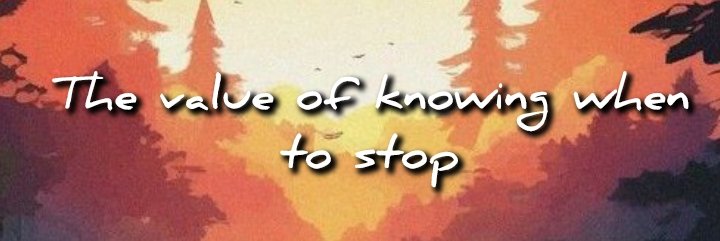

The presentation at the last Summer Game Fest was truly striking. From the outside, and up until a certain second in the trailer, it looked like just another "farming" game, but the moment in which the protagonist is distressed by her past breaks the viewer's ideas. So much so that it even motivated me to write about the trend of subverting expectations within the indie scene, known as "spin," in some impressions from months ago.
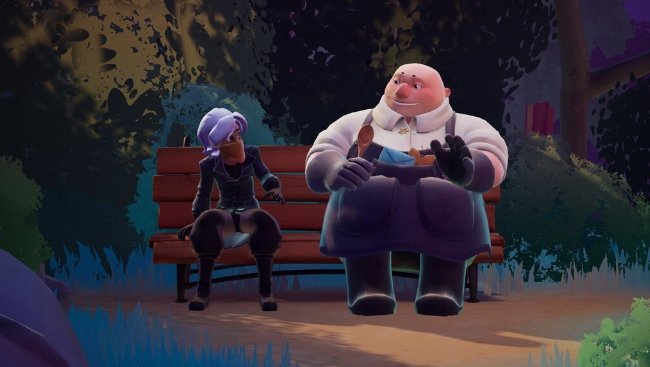


In Wanderstop, we play Alta, a virtuous warrior who, after years of being undefeated, is defeated several times in a row. Her method, based on effort and discipline, loses its effectiveness, forcing her to venture into the forest in the hope of finding an ancient master who can show her the path to improvement. Halfway there, she vanishes and reappears in a clearing in that same forest, where the tea shop that gives the game its name is located.
Boro, the friendly owner, encourages Alta to spend some time making tea, helping out around the shop, and meeting the visitors... or not. That's the first shock an exhausted Alta experiences: how complex it is to decide what to do when your entire life has been defined by a meticulous plan with a single goal in mind. In fact, this entire prologue delves into ideas that are so real, but rarely discussed in certain circles, like the idea that effort doesn't necessarily equal reward, or that thinking positively helps you project good things that will eventually happen to you.
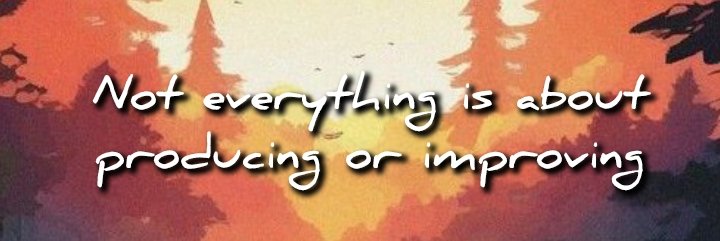

In fact, once Boro teaches us how to make tea and sets us free, Alta is hit with another reality check with her first customer. This first person to appear in the area has no particular interest in having tea; he simply wants to sit and rest for a while before continuing on his way. This fact, for someone as Cartesian as Alta, is a complete departure from her notions. Not everything can be a list of tasks with instant gratification upon completing each one.
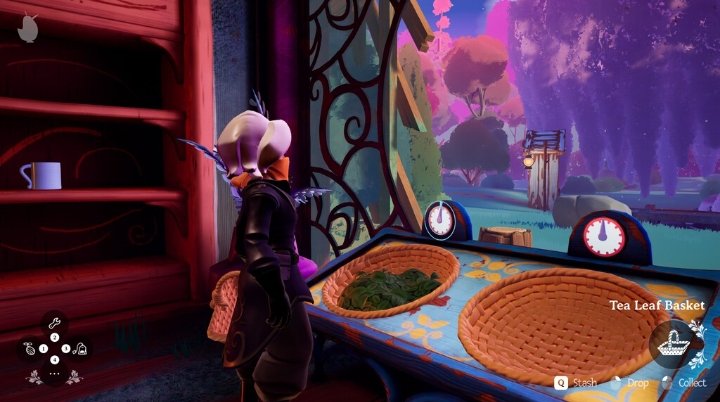


This is one of Wanderstop's most direct and consistent reflections, and it's one that applies to this whole wave of cozy games that end up being pastel-colored work simulators. Wreden tells The Guardian that the image of escaping to a tea shop in the middle of the woods came to him shortly after releasing The Beginners Guide in 2015, and that's when he realized: "I was completely burned out. I wanted to invoke some rest and relaxation within myself. I thought cozy games would help me heal. It didn't take long for me to realize I was wrong."
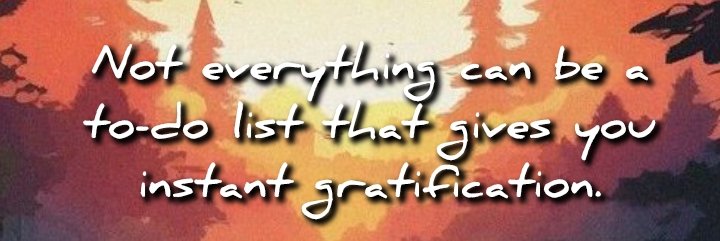

And Wanderstop is a cozy game that meets the definition of "cozy." Obviously, it's software programmed with ones and zeros, so you have to perform certain tasks to "progress" in the story, but the game's tone, personalized by Boro himself, invites you to do nothing specific or to indulge in other tasks that aren't essential or necessary. In addition to making tea and sitting down, which allows Alta to have an internal monologue about how she feels, you can read books, garden, tidy up, or take photos, for example.
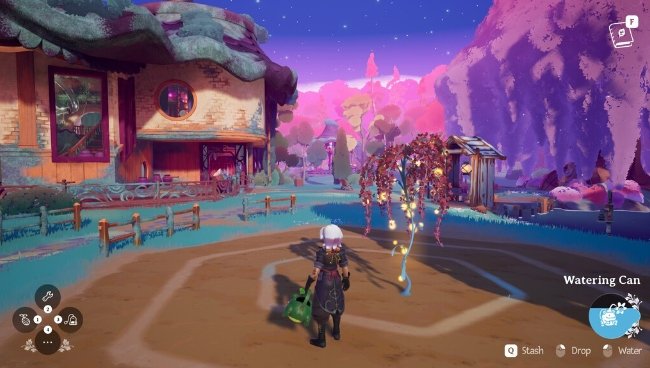
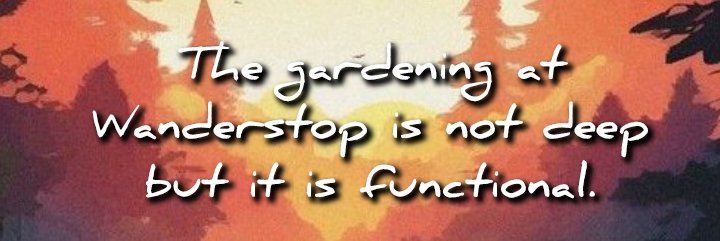

The story will progress, and Alta will progress in her quest to heal herself, but not necessarily through these gameplay milestones, but rather through the character's development and the bonds she develops. As Wreden explains: "We realized that the characters in Wanderstop had real conflicts and weren't well. They wouldn't magically heal by drinking tea in the middle of the woods."
Because Wanderstop avoids both absolute truths and cheap surprises, because "there's no magic bullet." What's revolutionary about Wanderstop isn't, again, the twists and turns of its plot or how it invents gameplay mechanics to tell us something (although there's certainly some of that). What's truly special about this game is the subject it addresses and how it does so, especially in the writing of the script.
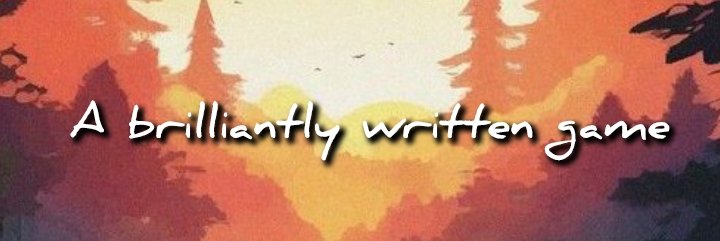

The creators are outstanding, but not only in the dialogue. Things like the books, especially those by Dirk Warhard, whom I highly recommend, speak volumes about the care with which Wanderstop's narrative has been crafted, but also about the talent and courage of its authors.


The Stanley Parable and Gone Home are two of the most revolutionary games in the indie scene, and arguably in history in general. They were key to the evolution of the medium, especially in renewing our understanding of what video games could do to tell stories.
Wanderstop isn't revolutionary in any way, but it is a necessary game. It addresses issues rarely reflected in video games, and does so in a very human way, posing groundbreaking questions such as the value of boredom in an industry where that word is synonymous with gigantic failure, or the shark mentality of top executives, applied to the personal level, has no other goal than to devour us all.
Wanderstop is a necessary game, one that addresses many current ills and is brave in not offering unequivocal solutions. Brilliantly written and with a remarkable soundtrack, Alta's story is also that of Davey Wreden, who already impressed us by speaking about his personal experiences in The Beginners Guide a decade ago, and who reflects, alongside other great creators, on the burnout that most of us are facing in our jobs and hobbies.
Thanks for coming here

• Images are taken from the game
• Translated by Google Translate

Versión en español
Hola muy buenas gran comunidad de @hivegc No hace demasiado hablé de la capacidad de los videojuegos para ayudar a llevar malos momentos, algo que me sucedió en primera persona con Kingdom Come Deliverance y su gran capacidad de inmersión. Esto es ciertamente habitual, el poder sanador de este arte, especialmente permitiendo que nuestra cabeza se adentre en mundos ficticios donde descansar de los duros momentos que vivimos en el real.
Sin embargo, no es tan habitual un videojuego haga el ejercicio inverso y use problemas del mundo real como inspiración. Porque esto es lo que pasa con Wanderstop, que a plena vista es un simulador de tienda de té con el clásico envoltorio cozy que tan de moda está, pero que principalmente es una obra que reflexiona sobre cuestiones como el síndrome del burnout, la obsesiva búsqueda de la productividad de nuestra civilización actual y lo desaconsejable de encontrar respuestas simples a problemas complejos.
Wanderstop era uno de mis videojuegos más esperados de este 2025, y la principal razón eran sus dos cabezas visibles: Davey Wreden y Karla Zimonja. El primero es el responsable de dos hitos del videojuego como The Stanley Parable y The Beginners Guide, y la segunda es una de las tres personas que concibieron Gone Home, además de poner voz a la protagonista. Además, eso de que la banda sonora estaba a cargo de Daniel "C418" Rosenfeld, quien ya creó varias de las notas más reconocibles de nada menos que Minecraft, pues sólo sumaba a la ecuación.


La presentación en la última edición del Summer Game Fest fue una realmente impactante. Desde fuera y hasta cierto segundo del tráiler, parecía un juego más "de granjas", pero el momento en el que su protagonista se ve angustiada por su pasado rompe los esquemas del espectador. Tanto que hasta me motivó a escribir sobre la tendencia de subvertir las expectativas dentro del plano independiente, el conocido como "girito", en unas impresiones de hace meses.
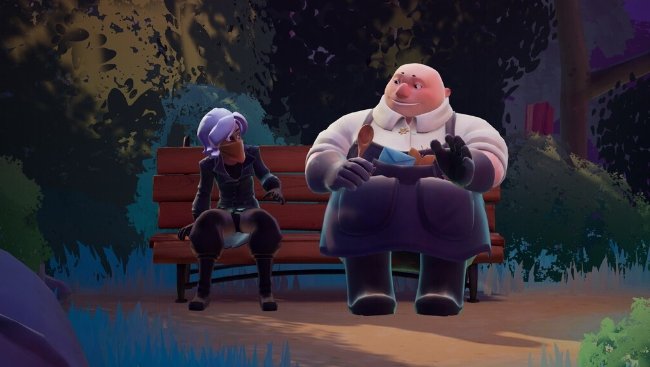


En Wanderstop damos vida a Alta, una virtuosa guerrera que tras años imbatida, pasa a ser derrotada en varias ocasiones consecutivas. Su método, basado en el esfuerzo y la disciplina deja de tener efecto, obligándola a internarse en el bosque con la esperanza de dar con una antigua maestra que pueda mostrarle el camino para la mejora. A mitad de camino se desvanece y aparece en un claro de ese mismo bosque, donde se ubica la tienda de té que da nombre al juego.
Boro, su simpático dueño, anima a Alta a pasar un rato preparando té, a echar un cable en la tienda y a conocer a los visitantes... O a no hacerlo. Ese es el primer choque sufrido por una exhausta Alta, lo complejo que es decidir qué hacer cuando toda tu vida ha estado definida por un plan minucioso con un único objetivo en mente. De hecho, todo ese prólogo ahonda en ideas tan reales pero poco comentadas en ciertos círculos como que el esfuerzo no tiene porqué ser igual a la recompensa, o que pensar en positivo sirve para proyectar cosas buenas que te acaban pasando.


De hecho, una vez que Boro nos enseña a hacer té y nos deja libres, llega otro golpe de realidad para Alta con el primer cliente. Y es que esa primera persona en aparecer por la zona no tiene especial interés en tomar un té, simplemente quiere sentarse por ahí y descansar un rato antes de seguir su camino. Ese hecho, para alguien tan cartesiana como Alta, es una rotura completa de sus esquemas. No todo puede ser una lista de tareas con la que sentir gratificación instantánea al terminar cada una de ellas.
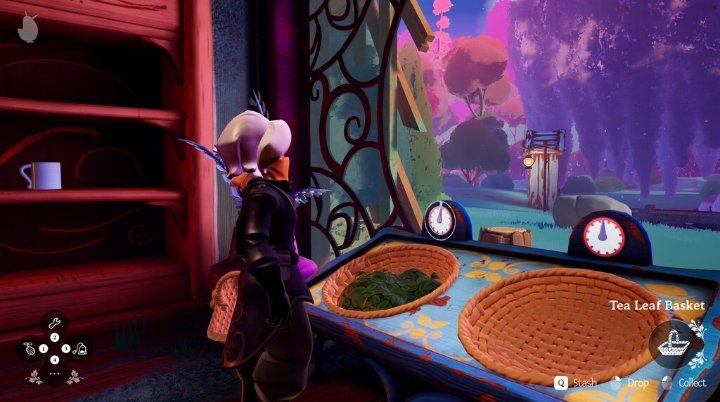


Esta es una de las reflexionas más directas y constantes de Wanderstop, y es una que se aplica a toda esta corriente de juegos cozy que acaban por ser simuladores de trabajo en colores pastel. Cuenta Wreden en una entrevista con The Guardian que la imagen de escapar a una tienda de té en medio del bosque le vino al poco de lanzar The Beginners Guide en 2015, y que ahí se dio cuenta : "Estaba completamente quemado. Quería invocar en mí algo de descanso y relajación. Pensaba que los juegos cozy me iban a ayudarme a curar. No tardé mucho en darme cuenta de que estaba equivocado".


Y es que Wanderstop es un juego cozy que cumple con la definición de "acogedor". Evidentemente, es un software programado con unos y ceros, por lo que hay que realizar ciertas tareas para "progresar" en la historia, pero el tono del juego, personalizado en el propio Boro, te invita a no hacer nada concreto o a darle un tiento a otras tareas que para nada son principales o necesarias. Además de hacerte un té y sentarte, algo que sirve para que Alta tenga un monólogo interno sobre cómo se siente, es posible leer libros, realizar jardinería, ordenar o hacer fotos, por ejemplo.
Por supuesto, hay un bucle jugable. Lo normal es que aparezcan clientes con un encargo de té concreto, y para completarlo tendremos que usar las semillas disponibles para crear todo tipo de plantas con frutos de diversos sabores y propiedades. Tras esto hay que hacer uso de una peculiar máquina para crear el brebaje y dárselo a la persona indicada.
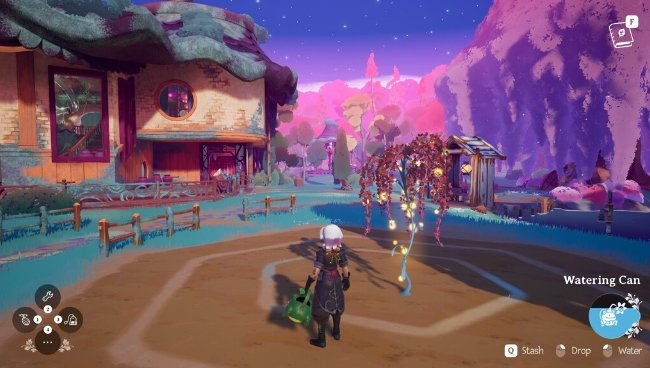


La historia avanzará y Alta irá progresando en su misión de sanarse, pero no necesariamente será en base a estos hitos jugables, si no a la evolución del personaje y los vínculos que irá adquiriendo. Así lo explica Wreden: "Nos dimos cuenta de que los personajes de Wanderstop tenían conflictos reales y no estaban bien. No se curarían mágicamente tomando té en medio del bosque".
Porque Wanderstop evita tanto las verdades absolutas como las sorpresas baratas, porque "no hay cura mágica". Lo revolucionario de Wanderstop no está en, nuevamente, los "giritos" de su trama o cómo se inventa mecánicas jugables para contarnos algo (aunque algo de eso hay, claro). Lo verdaderamente especial de este juego es el tema que trata y cómo lo hace, especialmente desde la escritura del guion.


Los creadores están a un nivel sobresaliente, pero no únicamente en los diálogos. Asuntos como los libros, en especial los de un tal Dirk Warhard que os recomiendo encarecidamente, hablan del mimo con el que se ha construido la narrativa de Wanderstop, pero también del talento y la valentía de sus autores.
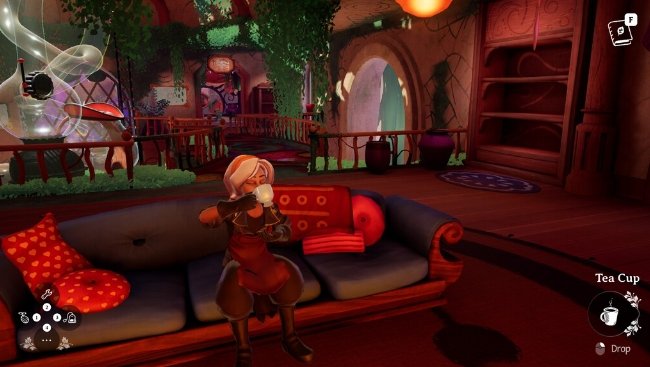

The Stanley Parable y Gone Home son dos de los juegos más revolucionarios de la escena independiente, y posiblemente de la historia en general. Fueron clave para hacer evolucionar al medio, especialmente para renovar las ideas que todos teníamos de lo que se podía hacer en los videojuegos para contar historias.
Wanderstop no es en absoluto revolucionario, pero sí que es un juego necesario. Trata temas muy poco reflejados en los videojuegos, y lo hace de una forma muy humana, planteándose cosas tan rupturistas como el valor del aburrimiento en una industria donde esa palabra es sinónimo de fracaso gigantesco o que la mentalidad de tiburón propia de los grandes ejecutivos de la misma, aplicada a nivel personal, no tiene más objetivo que devorarnos a todos.
Wanderstop es un juego necesario, que habla de muchos males actuales y que es valiente a la hora de no dar soluciones inequívocas. Genialmente escrito y con una notable banda sonora, la historia de Alta es también la de un Davey Wreden que ya nos impactó hablando de sus vivencias personales en The Beginners Guide hace una década, y que reflexiona, de la mano de otros grandes creadores, sobre el burnout al que estamos abocados la gran mayoría de personas en nuestros trabajos y hobbys.
Muchas gracias por yegar hasta aqui

• las imágenes son sacadas del juego
• traducido por el traductor de google



Nice
Congratulations @wil.iglesias! You have completed the following achievement on the Hive blockchain And have been rewarded with New badge(s)
Your next target is to reach 100 upvotes.
You can view your badges on your board and compare yourself to others in the Ranking
If you no longer want to receive notifications, reply to this comment with the word
STOPCheck out our last posts: